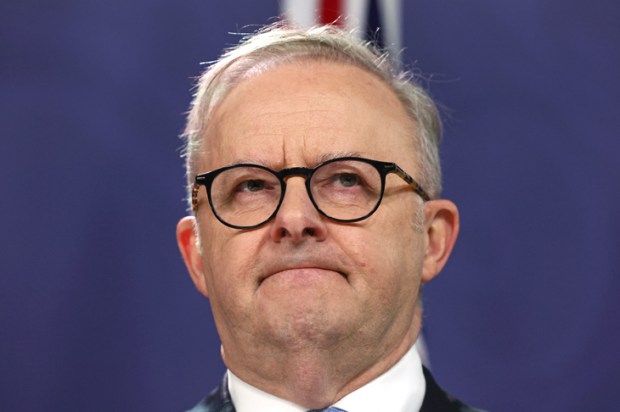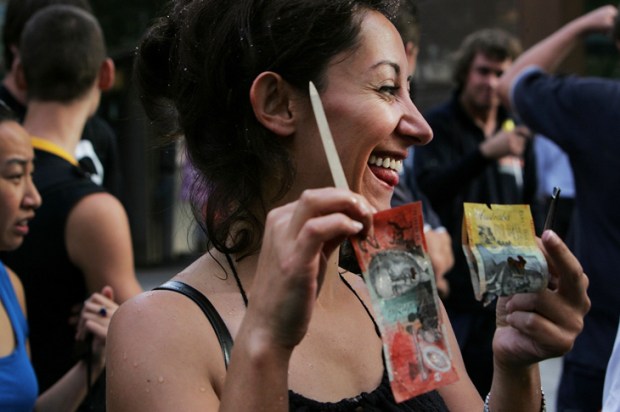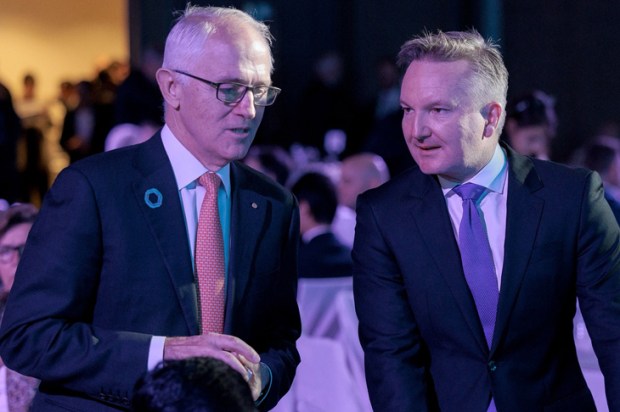Write an essay on what you did on your holiday, barks the teacher. My attempt is short: we waited. We waited to get a PCR test in Melbourne; we waited to get the result; we filled in the form designed by an illiterate teenager; and then we waited to get another PCR test in Queensland.
We didn’t actually wait around to get the result because the result was not a requirement of being in Queensland.
About the only sensible thing said about this destructive grab-bag of rules and regulations imposed by some states was uttered by the Commonwealth Chief Health Officer, Paul Kelly. ‘No sensible public health outcome results from people waiting hours for a PCR test and then waiting days for a result.’ It’s just a pity that this message didn’t get through the thick skulls of parochial premiers and their witless health ministers.
Now the one major problem with my answer is that it is so succinct that it won’t fill up the required column inches. So let me talk about something else that has been irritating me – the smugness of the federal government – in particular, the ever-smiling treasurer, Josh Frydenberg – in relation to the massive sums of our money spent to ‘save’ the economy from the damage of Covid.
Of course, it was not surprising to learn that Josh is one of the most liked politicians among a motley crew, according to some relatively pointless survey. When you are handing out other people’s money at the rate of knots, what’s not to love?
Well, in reality, there is a lot not to love, including the massive increase in government debt to be paid off by future generations and the very low quality of much of the spending by virtue of the spending spigot being fully turned on.
When the Port Adelaide Football Club receives $15 million from the federal government (from us, in point of fact) to fix up a ground on which games are not even played, you know there is problem. The examples of dubious spending are simply legion.
The fact that the Paris-based Organisation for Economic Cooperation and Development – now headed by our very own Mathias Cormann – assessed Australia as a top performer in terms of staving off negative growth associated with Covid was hardly surprising. The increase in government spending in Australia was among the highest of all developed economies.
In 2020-21, for instance, Australian government general sector payments rose by 17 per cent and total payments went close to 32 per cent of GDP. This increase is unprecedented in peacetime.
All the OECD is really telling us is that sugar hits work in the short term. The increase in government spending adds to the observed growth in GDP and any crowding out of private sector spending does not emerge for a time. The real problem with sugar hits is they need to be financed and some of the new spending can be difficult to withdraw.
And that’s why the increase in government debt is so frightening. Going into the pandemic, Australian government net debt was just below $500 billion or 25 per cent of GDP. The Coalition government had, in fact, failed to reduce government debt since it was elected in 2013, but there was a plan of sorts to reduce debt and largely eliminate it by the end of the 2020s.
That plan is now completely in tatters. In 2020-21, net debt soared to close to $600 billion and the (optimistic) expectation is that it will peak at just below $1 trillion by the end of decade.
Is it any surprise that the International Monetary Fund observed that Australia is the only G20 economy to have increased government debt by over 200 per cent since 2000? But Josh is not having a bar of the doubters. ‘The Morrison government threw the kitchen sink (is this a deliberate blooper?) at the challenge we faced, and we put an unprecedented amount of economic support to work and that’s helped see Australia recover to the point that we are now.’
According to Treasury’s wonky advice, as long as the nominal growth of the economy is greater than the interest rate on the debt, it is possible to run budget deficits (and continue to run up debt) while reducing the ratio of government debt to GDP. And this is precisely what a Coalition government expects to do were it to remain in government – continue to run budget deficits into the next decade.
Mind you, this advice doesn’t take into account any slips between the cup and lip. A slump in nominal GDP growth is entirely possible, particularly if the terms of trade were to fall sharply. It is also entirely possible the interest rate on government debt could rise sharply, especially in the context of accelerating inflation overseas and the moves by a number of central banks to raise their cash rates.
But Treasury has become a monolithic empire devoted to Keynesian thinking with no scope for alternative opinions. For a treasurer like Josh, it is a good fit. He wants to be loved and advice that unconstrained spending is not just a positive but essential – to support an economy, you must understand – is unquestioningly accepted.
This is notwithstanding the fact that by the end of last year, it was clear that parts of the economy were already at full capacity and the rate of unemployment was less than 5 per cent. Go figure.
Note here that the Treasury had had its staff numbers trimmed in recent years but, according to the Secretary to the Treasury, “we scaled up during difficult times with recruitment of 612 employees”. This is close to a two-thirds increase. And there will be 75 new graduates in 2022.
Needless to say, the Secretary takes the view that his department has done a splendid job during the pandemic. ‘Treasury’s work in 2021 has been vital in the response to and recovery from the pandemic.’
Laughably, he mentions that, ‘our role required a focus on program delivery.’ But he doesn’t express any embarrassment about JobKeeper, whose deficient design has cost taxpayers (us) at least $30 billion in unnecessary spending.
So, the answer to the question ‘what did I do on my holiday?’ is wait and fume. Wait because I was forced to, and fume because of the government’s wilful disregard of prudent fiscal management.
Got something to add? Join the discussion and comment below.
Get 10 issues for just $10
Subscribe to The Spectator Australia today for the next 10 magazine issues, plus full online access, for just $10.
You might disagree with half of it, but you’ll enjoy reading all of it. Try your first month for free, then just $2 a week for the remainder of your first year.














Comments
Don't miss out
Join the conversation with other Spectator Australia readers. Subscribe to leave a comment.
SUBSCRIBEAlready a subscriber? Log in